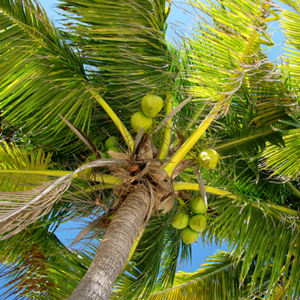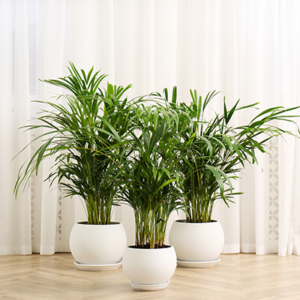Palm trees symbolize warm weather and are a defining feature of the Florida skyline. Several types of palm trees line the beaches, roads, and parks of our beautiful Sunshine State. Many of these palm trees are tall and elegant, swaying back and forth in the breeze, while others are small and fit perfectly into the landscapes of homes and businesses.
If you’ve always lived in Pensacola, you might no longer notice their tranquil beauty. If you’re a snowbird or moved here from a northern state, you may have grown accustomed to their abundance. Still, we bet you didn’t know these ten fun facts about these majestic trees. Read on to discover how palm trees have been around for ages—and how they can sometimes be deadly!
1. Some Pensacola Palm Trees Can Become Giants
Some palm trees can grow to impressive heights! The Quindio wax palm, the tallest palm species, can reach up to 200 feet. Mexican fan palms grow up to 100 feet, while Date palms can grow rapidly to 80 feet high. These towering trees add a dramatic touch to the Florida landscape.
2. There Are Over 2500 Species of Palms
There are more than 2,500 palm tree species globally, belonging to the Arecaceae plant family. While most thrive in tropical rainforests, some can even survive in arid regions. Did you know that the needle palm is so hardy it can grow in Alaska? Palm trees are truly versatile!
3. Palm Trees Play an Important Part in History and Religion
Palm trees have been around for over 5,000 years and are historically significant. In ancient Mesopotamia, palms served as a food source and material for tools and shelter. Romans viewed palm branches as a symbol of victory. In Christianity, palms symbolize Jesus’s triumphal entry into Jerusalem.
4. Not All Palm Trees Bear Edible Fruit
While some palm trees in Pensacola produce coconuts, dates, and acai berries, others can be dangerous. The sago palm, for instance, is toxic to humans and animals. Always know your palm species before consuming their fruit or consult an arborist.
5. Some Palm Trees Can Live More Than a Century
Some palm trees can live for more than 100 years! Their longevity may even make them the oldest living trees. Scientists attribute this to their unique cellular structure, which doesn’t replace old cells like other trees. As a result, palms remain sturdy throughout their long lives.
6. Palm Trees Lack Traditional Tree Rings
Unlike other trees, palms don’t have growth rings to indicate age. Instead, their trunks contain vascular tissues called xylem and phloem, which maintain the tree’s narrow structure while supporting its fronds and fruit. This unique growth pattern helps palms stay robust.
7. You Can Grow Palm Trees in Containers on Your Pensacola Patio
Want to add tropical flair to your patio? You can grow palms in containers! The Pygmy date palm, dwarf palmetto, European fan palm, and sago palm are ideal for pots. Use well-draining soil and prune yellowing fronds to keep them healthy.
8. Most Palms Could Use a Good Washing
Palm trees in Pensacola enjoy an occasional full wash. Spraying the fronds with water helps remove dust, pests, and insects like mites and mealybugs. A quick rinse also provides moisture, promoting overall palm health.
9. Palm Trees Can Be Dangerous—Handle with Care
Palm fronds can be surprisingly hazardous. Falling fronds are heavy enough to cause injury or even death. Trimming tall palms is best left to professionals with the right equipment and experience. Avoid DIY palm maintenance for your safety.
10. Palms Are Endangered
About 100 palm tree species are endangered, mainly due to deforestation, unsustainable farming, and palm oil production. The Hyophorbe amaricaulis, for example, has only one known specimen left, protected in a botanical garden. Conservation efforts are crucial to preserving these majestic trees.
Protect Your Pensacola Beloved Palms With Lawn Master’s Comprehensive Plant Health Care Program
When it comes to your trees and plants’ health, they need the attention and care only a professional lawn care company can provide. Lawn Master offers a four-step comprehensive, year-round plant health care program with timely services designed for the specific plants found here in Pensacola. Our plant health care program was designed to promote the healthy growth of all your trees and shrubs, including those beloved majestic palms, and protect them from the threat of insects, disease, heat and drought stress, and too much rainwater.
Find out more about our plant health care program by visiting our website, filling out our online form, or giving us a call at 850-476-1601.
If you enjoyed the informative article above, please share it with family and friends. Then follow our other monthly blog articles here.